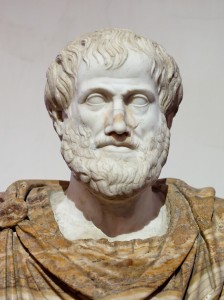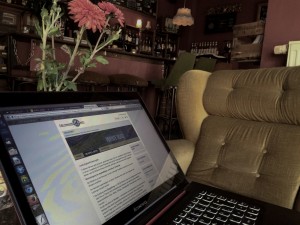One of the key questions to answer when doing political theory is the question of what or who these humans are whose political world shall be described. And that is not an easy feat. In Classical Aristotelian philosophy, humans – like the other objects of nature – are defined by an innate purpose, a telos. Political life, hence, is essentially about realizing that purpose in living together with others – being social animals. Conceptions of the self drawing on this idea can be found, for example in Jean-Jacques Rousseau or Hannah Arendt as well as some communitarian positions. One could further argue, that political theories of human progress towards as specific goal, such as for example Karl Marx‘s philosophy of history, pick up that idea of a human purpose to be realized.
A lot of modern political thought, however, has rejected the presumption that humans are social by nature. In contrast to pure classical ideas much of modern political thought focused on negative aspects of human nature. Niccolo Machiavelli describes human beings as unreliable, untrustworthy and prone to fail to do the right thing. Thomas Hobbes goes so far as to call man man’s wolf – its own worst enemy. Consequently, political institutions are designed around the idea that this dangerous nature must be controlled. Human nature as purpose makes way for human nature as somewhat of a natural force too be reckoned with. Later modern philosophers, such as for example John Locke, diversify this idea by complementing human nature with natural rights. Liberal positions acknowledge human nature as not necessarily good, but build their political theories based on the idea that innate rights must be realized by any system.
The twentieth century has brought about another, quite distinct idea. Thereby human nature is not something natural that must simply be known, brought about or realized. Instead, who we are is socially constructed and not fixed. This is not at all unrelated to the previous strands of modern thought, on the contrary. Machiavelli is the first famous proponent of the idea that the individual does not in fact live in a natural order, but that order itself is man-made and can be changed and re-arranged to suit man’s purposes. If our social order is not natural and we are influenced by this order that we ourselves created, it is not so far out there that the way this order is arranged makes us who we are. Michel Foucault’s big feat was to trace the ways in which modern systems of government shaped individuals themselves and how, in fact, the individual was unthinkable without the discursive order that presupposed it. Foucault focuses on some very specific institutions to show the pattern – hospitals and prisons in particular. In his studies on govermentality he exemplifies the modern system of government as one producing a particular kind of self – the liberal self.
At work are mechanisms of subjectivation, mechanisms of making subjects. I myself have never quite understood how this works until I became a mother. As a pregnant woman in Germany you are inserted into an elaborate machine which monitors any aspect of your pregnancy. At your first doctor’s visit you receive a “Mutterpass” (Mother-Passport). This document essentially transforms you into a mother. Your medical data is inserted and always marked in relation to the normal (i.e. averaged) development of mother and child. You progress along this expected “normal progression” of the pregnancy is measured and any deviance raises flags. Surely, no-one forces any exams and a wide variety of deviations may be perfectly normal. But the “mother” is created in a permanent struggle between the woman, the child, the data, the law, the doctor, the midwife and the statistic – as well as any other persons or institutions voicing an interest such as employers, insurances or social welfare actors. Between natural events, rules, discourses and normalization pressures one is turned into a mother. No two mothers are alike, but they all share that struggle for who they are. This, to me, illustrates vividly how subjects emerge.
Michel Foucault calls these relations power relations. He is known as the theorist of power who lays out the horizontal workings of power and proposes to think of power as something dispersed in the capillaries of society rather than centralized in few places. He insists, however, that his main interest has always been the subject, or rather the way we are made into subjects. “The subject and power” was written to illuminate what this means. It talks about the subject, the relationship between power and freedom and the struggles of the subjects. It is one of the texts that merit re-reading every once in a while, even as they fail to tell the whole story. It adresses many of Foucault’s propositions in passing only so we will have a lot to talk about. I look forward to it!
If you have further readings on any of these authors or ideas to suggest, use the comment section!



![Michel Focault Mural, photo by thierry ehrmann [CC BY 2.0 ]](https://blogs.fu-berlin.de/subjectstocyborgs/files/2016/04/Michel_Focault_Mural-300x202.jpg)


 Die
Die